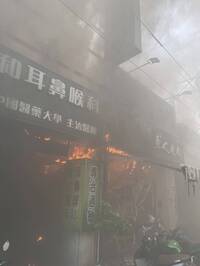《TAIPEI TIMES》CECC announces foreign arrival rules

Chinese spouses of Taiwanese whose children are stuck in China because of the COVID-19 pandemic petition outside the Central Epidemic Command Center in Taipei yesterday for their children to be allowed to return to Taiwan. Photo: Liao Chen-huei, Taipei Times
TRAVEL:Students and business travelers from 11 nations and areas would be allowed entry, but the KMT said those from some parts of China should also have been included
By Lee I-chia / Staff reporter
The Central Epidemic Command Center (CECC) yesterday announced four criteria for foreign students and short-term business travelers from 11 countries and areas with a lower COVID-19 risk who want to apply for a shortened quarantine period upon arrival in Taiwan. The list does not include China.
About 1,100 Chinese students enrolled at National Tsing Hua University and Shih Hsin University earlier this month launched an online petition to the Minsitry of Education to allow them to resume their studies in the nation.
Minister of Health and Welfare Chen Shih-chung (陳時中), who heads the center, said that the relaxing of border controls would begin by allowing entry to foreign travelers from lower-risk countries and areas, adding that eligibility could be expanded depending on the actual effects and management capability after the policy is implemented.
Travelers would be eligible for entry if they are applying to stay in Taiwan for less than three months; are participating in short-term business activities, such as examining goods, providing after-sales services, technical support and training, or signing a contract; are departing from countries or areas designated by the CECC as low to medium-low infection risk; and have not visited other countries or areas within 14 days of their departure.
As all people eligible to enter Taiwan are put under 14-day home quarantine upon arrival, the new policy intends to make it easier for short-term business travelers to visit with a shorter quarantine period, Chen said.
“Those departing from low to medium-low infection risk countries or areas can apply for a polymerase chain reaction [PCR] test, paid out-of-pocket, after five or seven days of quarantine,” he said, adding that they must continue to practice self-health management for 21 days after entry if they test negative.
Those from low-risk countries would be allowed to leave quarantine after five days, while those from medium-low infection risk countries would be quarantined for seven days.
Eligible business travelers should provide their invitation documents, travel itinerary and disease prevention plan, as well as a negative PCR test result obtained within three days of boarding their flight, when applying for the shortened quarantine period, Chen said.
The low infection risk countries or areas include New Zealand, Australia, Macau, Palau, Fiji, Brunei, Vietnam, Hong Kong, Thailand, Mongolia and Bhutan.
The medium-low infection risk countries include South Korea, Japan, Malaysia and Singapore, Chen said.
Centers for Disease Control Director-General Chou Jih-haw (周志浩) said that the list would be revised every two weeks to reflect the COVID-19 situation in each country or area.
Students who are due to graduate this year would have first priority for returning to Taiwan, followed by students in their second year or above, and lastly, freshmen, Minister of Education Pan Wen-chung (潘文忠) said.
They would be put in quarantine hotels before being allowed to return to their campuses, Pan added.
Among a total of 8,199 foreign students who have not returned to Taiwan, 2,238 students from the 11 listed countries would be among the first batch eligible to return, he said.
Meanwhile, the Chinese Nationalist Party (KMT) said that it welcomes the central government’s decision to allow overseas students to return.
However, the government should allow Chinese students to return based on the COVID-19 situation in different Chinese provinces, it said.
The party called on President Tsai Ing-wen’s (蔡英文) administration to stop what it described as a “discriminatory” practice.
It asked why the CECC had, at the begining of the pandemic, assigned levels of risk and border restrictions according to different provinces, cities or other regions in China, but was not following the same principle with regards to the admittance of students.
Citing official Chinese data, the KMT said that with the exception of Beijing, the other seven provinces or cities where Chinese students studying in Taiwan come from should be considered “low-risk” areas.
Additional reporting by Sherry Hsiao
新聞來源:TAIPEI TIMES




















